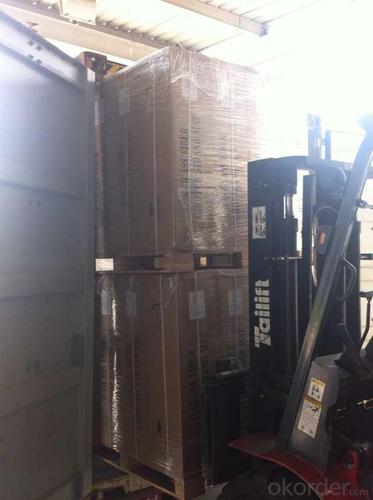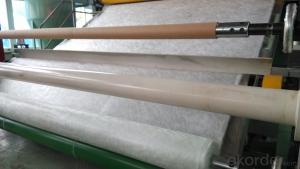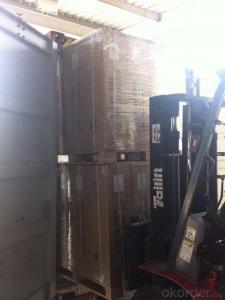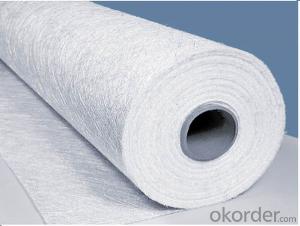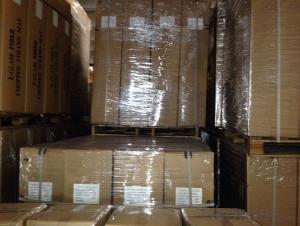Fiberglass Mat Tissue E Glass Fiber Chopped Strand Mat (Emulsion)
- Loading Port:
- China Main Port
- Payment Terms:
- TT or LC
- Min Order Qty:
- 20000 kg
- Supply Capability:
- 200000Kg Per Month kg/month
OKorder Service Pledge
OKorder Financial Service
You Might Also Like
1.Brief Introduction
E-Glass Emulsion Chopped Strand Mat is made of randomly distributed chopped strands held tighter by a emulsion binder. It is compatible with UP, VE, EP resins.
It is compatible with UP, VE, EP, PF resins.
The roll width ranges from 50mm to 3300mm.
Additional demands on wet-out and decomposition time may be available upon request.
It is designed for use in hand lay-up, filament winding, compression molding and continuous laminating processes. Its end-use applications include boats, bath equipment, automotive parts, chemical corrosion resistant pipes, tanks, cooling towers and building components
Fast breakdown in styrene
High tensile strength, allowing for use in hand lay-up process to produce large-area parts
Good wet-through and fast wet-out in resins, rapid air lease
3.Product Specifications
Property | Area Weight | Moisture Content | Size Content | Breakage Strength | Width |
(%) | (%) | (%) | (N) | (mm) | |
Mathods | IS03374 | ISO3344 | ISO1887 | ISO3342 | |
EMC80E | ±7.5 | ≤0.20 | 8-12 | ≥40 | 50-3300 |
EMC100E | ≥40 | ||||
EMC120E | ≥50 | ||||
EMC150E | 4-8 | ≥50 | |||
EMC180E | ≥60 | ||||
EMC200E | ≥60 | ||||
EMC225E | ≥60 | ||||
EMC300E | 3-4 | ≥90 | |||
EMC450E | ≥120 | ||||
EMC600E | ≥150 | ||||
EMC900E | ≥200 |
4.FAQ
Packaging:
Each Chopped Strand Mat is wound onto a paper tube which has an inside diameter of 76mm and the mat roll has a diameter of 275mm. The mat roll is wrapped up with plastic film,and then packed in a cardboard box or wrapped up with kraft paper. The rolls can be vertically or horizontally placed. For transportation, the rolls can be loaded into a cantainer directly or on pallets.
Storage:
Unless otherwise specified, Chopped Strand Mat should be stored in a dry, cool and rain-proof area. It is recommended that the room temperature and humidity should be always maintained at 15℃~35℃ and 35%~65% respectively.
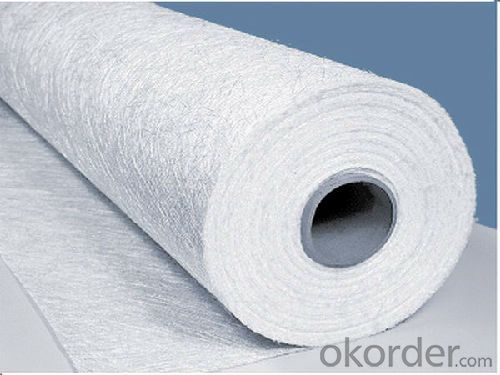
- Q: What is the expected lifespan of fiberglass mat tissue in power generation applications?
- The expected lifespan of fiberglass mat tissue in power generation applications can vary depending on various factors such as the specific application, environmental conditions, maintenance practices, and quality of the material used. However, fiberglass mat tissue is typically designed to have a long lifespan and can often last for several decades in power generation applications when properly installed and maintained.
- Q: What is the maximum temperature fiberglass mat tissue can withstand?
- The ability of fiberglass mat tissue to endure high temperatures is influenced by several factors, including the type of fiberglass utilized, the thickness of the tissue, and the manufacturing process. Typically, fiberglass mat tissue can withstand temperatures up to 1000°F (538°C) without experiencing significant deterioration or loss of mechanical properties. However, it is important to bear in mind that prolonged exposure to elevated temperatures can still lead to some decline in the material's performance. For applications that demand increased temperature resistance, specialized fiberglass materials with enhanced heat resistance can be employed. To obtain precise temperature ratings and guidelines for the specific fiberglass mat tissue being utilized, it is advisable to consult the manufacturer or supplier.
- Q: How long does fiberglass mat tissue last?
- The durability and longevity of fiberglass mat tissue can change depending on different factors, including its quality, usage, and exposure to external conditions. Typically, fiberglass mat tissue is designed to be highly durable and long-lasting. When installed and maintained correctly, it can endure for many decades. However, it is worth noting that fiberglass mat tissue can degrade over time due to environmental elements like UV exposure, moisture, and temperature fluctuations. Continuous exposure to harsh weather conditions, extreme temperatures, or chemicals can speed up the deterioration process. To maximize the lifespan of fiberglass mat tissue, it is vital to adhere to the manufacturer's guidelines for installation, maintenance, and regular inspections. Regular inspections can help detect any signs of wear, damage, or degradation early on, enabling timely repairs or replacements. For specific information regarding the expected lifespan of a particular fiberglass mat tissue and its intended application, it is advisable to seek advice from a professional or directly consult the manufacturer. The expected lifespan can vary depending on the specific product and its intended use.
- Q: Is fiberglass mat tissue fire-resistant?
- Fiberglass mat tissue is not naturally fire-resistant, contrary to popular belief. Although fiberglass itself is non-combustible, manufacturers usually mix the mat tissue with a flammable binder or resin. Nevertheless, there are specialized fiberglass mat tissue options that have undergone treatment with fire-resistant coatings or additives. These treated materials offer enhanced fire resistance properties and are frequently utilized in construction and insulation materials that prioritize fire safety. It is crucial to carefully examine the product specifications or seek advice from the manufacturer to ascertain the fire resistance capabilities of a specific fiberglass mat tissue.
- Q: What are the potential limitations of using fiberglass mat tissue?
- Using fiberglass mat tissue comes with several potential limitations. To begin with, fiberglass mat tissue tends to be more brittle compared to other materials. This means that it may crack or break easily under certain conditions, especially if it is subjected to high levels of stress or impact. This brittleness can restrict its use in applications where durability and flexibility are important. Moreover, fiberglass mat tissue is not naturally resistant to moisture. If it is exposed to water or high humidity for extended periods, it can absorb moisture and lose its structural integrity. Consequently, it may not be suitable for use in environments where moisture resistance is crucial. In addition, working with fiberglass mat tissue can be challenging due to its sharp edges and fibers. Taking special precautions such as wearing protective clothing and using proper handling techniques is necessary to avoid injury. This can add complexity and cost to the use of fiberglass mat tissue in certain applications. Furthermore, cutting or manipulating fiberglass mat tissue can release fine particles or fibers into the air. Inhaling these particles can pose health risks, potentially leading to respiratory issues or irritation. To minimize these risks, it is essential to take proper safety measures such as using masks and ensuring adequate ventilation. Lastly, fiberglass mat tissue is relatively expensive compared to some alternative materials. Its production process involves multiple steps and specialized equipment, which contributes to higher costs. As a result, its use may be limited in applications where cost-effectiveness is a primary concern. In conclusion, while fiberglass mat tissue offers various advantages in terms of strength, insulation, and fire resistance, it is crucial to carefully consider its potential limitations before choosing it for a specific application.
- Q: Does fiberglass mat tissue require any special precautions during storage?
- Yes, fiberglass mat tissue does require some special precautions during storage. Fiberglass is a delicate material and can be easily damaged if not stored properly. Here are some precautions to consider: 1. Keep it dry: Fiberglass mat tissue should be stored in a dry and moisture-free environment. Moisture can cause the material to lose its strength and integrity. 2. Avoid direct sunlight: UV rays from sunlight can degrade fiberglass over time. Store the material in a cool, shaded area away from direct sunlight to prevent any damage. 3. Protect from dust and dirt: Fiberglass mat tissue should be stored in a clean and dust-free environment. Dust and dirt particles can get embedded in the material, making it less effective. 4. Avoid extreme temperatures: Extreme heat or cold can also affect the quality of fiberglass mat tissue. It is best to store it in a temperature-controlled environment to prevent any damage. 5. Use proper packaging: If the fiberglass mat tissue comes with packaging, it is recommended to keep it in its original packaging to provide an additional layer of protection. If not, consider using a durable and moisture-resistant wrapping material. By following these precautions, you can ensure that your fiberglass mat tissue remains in good condition during storage and is ready for use when needed.
- Q: Does fiberglass mat tissue require any special curing conditions?
- Fiberglass mat tissue does not typically require any special curing conditions. It can be cured at room temperature without the need for high temperatures or specific curing environments. The curing process of fiberglass mat tissue involves the application of resin, which hardens and bonds with the fibers over time. This curing can occur naturally at room temperature or can be accelerated with the use of heat or catalysts. However, it is important to follow the manufacturer's instructions and recommendations for the specific type of fiberglass mat tissue being used, as some variations may have specific curing requirements.
- Q: What are the different quality standards for fiberglass mat tissue?
- There are several quality standards for fiberglass mat tissue, including weight per unit area, tensile strength, elongation, tear resistance, and moisture content. These standards ensure that the fiberglass mat tissue meets certain performance criteria and can be used effectively in various applications such as roofing, insulation, and composite materials.
- Q: Can fiberglass mat tissue be used for roofing?
- Yes, fiberglass mat tissue can be used for roofing. Fiberglass mat tissue is a type of material that is commonly used in the construction industry for various purposes, including roofing. It is known for its durability, strength, and ability to withstand harsh weather conditions. Fiberglass mat tissue is often used as a reinforcement layer in roofing systems, providing additional strength and stability to the roof. It helps to improve the overall performance and longevity of the roof by offering excellent resistance to water, fire, and other external factors. Additionally, fiberglass mat tissue is lightweight and flexible, making it easier to handle and install on roofs of different shapes and sizes. Overall, fiberglass mat tissue is a suitable choice for roofing applications due to its superior properties and performance.
- Q: How does fiberglass mat tissue compare to spray foam insulation?
- Fiberglass mat tissue and spray foam insulation are two different types of insulation materials with their own unique characteristics and benefits. Fiberglass mat tissue is a type of insulation made from woven strands of fiberglass. It is typically used in applications where thermal insulation is required, such as in walls, roofs, and attics. Fiberglass mat tissue is known for its high resistance to heat transfer, making it an effective insulator. It is also fire-resistant, which adds an additional safety benefit. On the other hand, spray foam insulation is a type of insulation that is applied as a liquid and expands into a solid foam. It can fill in small cracks and gaps, creating an airtight seal, which makes it an excellent choice for preventing air leakage and reducing energy loss. Spray foam insulation is also known for its excellent soundproofing qualities. In terms of installation, fiberglass mat tissue usually comes in large rolls or batts that need to be cut and fitted into place. It requires careful handling to ensure proper installation and may require the use of protective equipment, such as gloves and masks, as the fibers can cause skin and respiratory irritation. Spray foam insulation, on the other hand, is applied using specialized equipment that sprays the liquid foam onto the desired surface. It expands quickly, filling in any gaps or voids, and hardens within a short period of time. This makes it a more convenient option for insulating hard-to-reach areas or irregularly shaped spaces. When comparing the two, fiberglass mat tissue is generally more cost-effective, as it is less expensive to purchase and install compared to spray foam insulation. However, spray foam insulation provides better air sealing and can offer higher energy savings in the long run. In summary, fiberglass mat tissue and spray foam insulation have their own advantages and are suited for different insulation needs. Fiberglass mat tissue is a good option for thermal insulation, while spray foam insulation excels in air sealing and soundproofing. The choice between the two ultimately depends on factors such as budget, desired insulation performance, and the specific requirements of the project.
Send your message to us
Fiberglass Mat Tissue E Glass Fiber Chopped Strand Mat (Emulsion)
- Loading Port:
- China Main Port
- Payment Terms:
- TT or LC
- Min Order Qty:
- 20000 kg
- Supply Capability:
- 200000Kg Per Month kg/month
OKorder Service Pledge
OKorder Financial Service
Similar products
Hot products
Hot Searches
Related keywords



